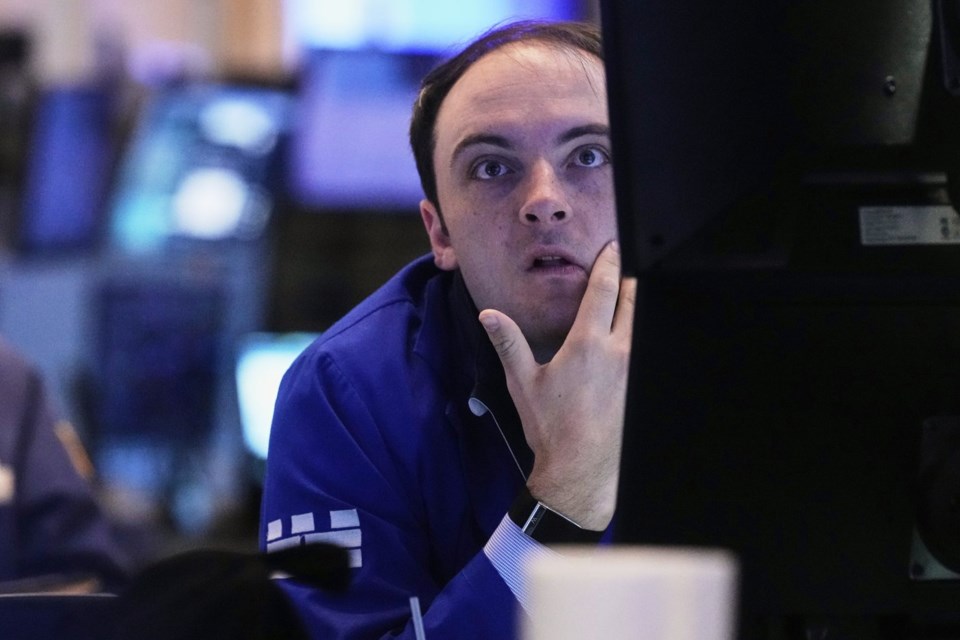NEW YORK (AP) — U.S. stocks are falling after some of the country’s biggest retailers gave mixed forecasts for where they see their profits heading under the uncertainty caused by President Donald Trump’s trade war. The S&P 500 was down 0.6% in early trading Wednesday. The index is on track for a second straight drop after breaking a six-day winning streak. The Dow Jones Industrial Average was down 327 points, and the Nasdaq composite was 0.6% lower. Stocks were also feeling pressure from rising Treasury yields in the bond market. Target slumped after reporting weaker results than analysts expected for the start of the year.
THIS IS A BREAKING NEWS UPDATE. AP’s earlier story follows below.
Wall Street was headed lower early Wednesday after a major U.S. retailer blamed its grim forecast on tariff concerns and oil prices rose on a media report that Israel may be planning an attack on Iranian nuclear facilities.
Futures for the S&P 500 were down 0.5% before bell and the Dow Jones Industrial Average slid 0.8%. Futures for the tech-heavy Nasdaq also fell 0.5%.
Target reported that sales fell more than expected in the first quarter and the retailer warned they'll slip this year as consumers, worried about tariffs, pull back on spending.
Target said it now expects a low-single digit decline in sales for 2025 and adjusted earnings per share to be anywhere from $7 to $9. When Target reported its fourth-quarter results in March, it forecast earnings per share for 2025 to be between $8.80 and $9.80 per share.
A growing number of companies have recently said tariffs and uncertainty about the economy are making it difficult to guess what the upcoming year will bring. Others, including Walmart, have said they'll have to raise prices to offset the widespread import taxes imposed by President Donald Trump.
Markets in recent weeks have recovered much of their losses from earlier in the year as Trump has delayed or rolled back many of the stiff tariffs he's imposed in an attempt to compel companies to move manufacturing back to the U.S. Investors are hopeful that Trump will lower his tariffs further after reaching trade deals with other countries.
On the winning side Wednesday was the hardware store chain Lowe's, which hit Wall Street's sales and profit targets and kept its forecast for the year unchanged.
Oil prices rose close to 1% after a CNN report cited unnamed intelligence officials saying Israel may be preparing for an attack on Iranian nuclear facilities. Oil prices tend to rise with conflicts that might disrupt oil supplies.
U.S. benchmark crude oil gained 50 cents to $62.53 per barrel, while Brent crude, the international standard, rose 48 cents to $65.86 per barrel.
In talks on the nuclear issue, Iranian officials have warned they could pursue a nuclear weapon with their stockpile of uranium enriched to near weapons-grade levels. U.S. President Donald Trump has repeatedly threatened to unleash airstrikes targeting Iran’s program if a deal isn’t reached.
Elsewhere, in Europe at midday, Germany's DAX fell 0.2%, the CAC 40 in Paris declined 0.5% and Britain's FTSE 100 was virtually unchanged.
In Asia, Tokyo’s benchmark Nikkei 225 fell 0.6% to 37,298.98. Gains have been limited by the continued worries over higher tariffs Trump has imposed on many U.S. trading partners since taking office. Earlier this week, Japanese officials said they were insisting all of his higher tariffs on imports from Japan be removed as part of talks with Washington.
Japan's exports have slowed due to the tariffs, the government reported Wednesday. Exports to the U.S., Japan's largest single trading partner, fell almost 2% year-on-year in April and the annual rate of growth in its global exports slowed to 2% from 4% in March, preliminary customs data showed.
In Hong Kong, the Hang Seng picked up 0.6% to 23,827.78, while the Shanghai Composite index edged 0.2% higher to 3,387.57.
Australia's S&P/ASX 200 surged 0.5% to 8,386.00, while the Kospi in South Korea climbed 0.9%, to 2,625.58.
Taiwan's Taiex advanced 1.3% and India's Sensex gained 0.5%.
In currency trading, the U.S. dollar fell to 143.81 Japanese yen from 144.51 yen. The euro rose to $1.1320 from $1.1284.
Elaine Kurtenbach And Matt Ott, The Associated Press




